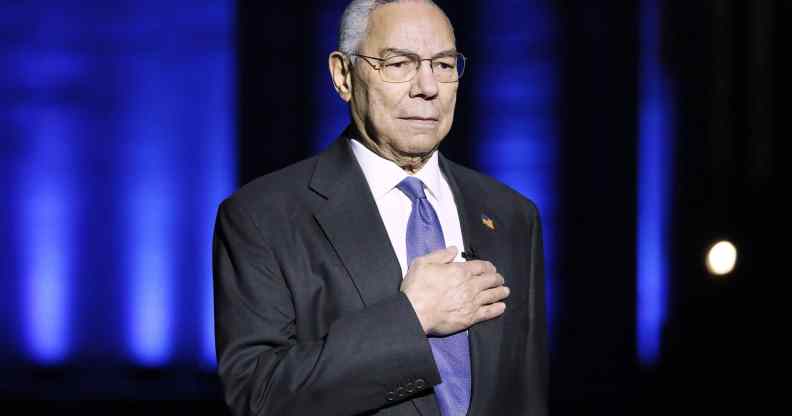Tributes pour in for Colin Powell, the first Black US secretary of state, after death from COVID

Colin Powell. (Getty)
Former US secretary of state Colin Powell died Monday morning (18 October) due to COVID-19 complications.
He was 84 years old and fully vaccinated, but was battling multiple myeloma, a type of blood cancer that may have made him more susceptible to COVID-19 symptoms.
Powell made history as the first Black secretary of state in 2001 under Republican president George W Bush.
As a moderate Republican, his early career held multiple controversies – Powell worked closely with then-UK prime minister Tony Blair during the early years of the Iraq War, helping to gather support for the now widely rebuked campaign.
He also previously supported a ban on military service by gay men and lesbians in the 90s, and was chairman of the Joint Chiefs of Staff when “Don’t Ask, Don’t Tell” (DADT) was implemented in 1993.
But in later years Powell became known for turning his back on Republicanism and supporting LGBT+ rights causes. In 2008, Powell broke with his party to endorse Barack Obama, going on to endorse him a second time in 2012. In 2010, he came out in favour of repealing DADT, helping to ring the death knell for the discriminatory policy.
The move was widely celebrated by Human Rights Campaign, the largest LGBT+ advocacy group and political lobbying organisation in the United States.
“His powerful voice for ending ‘Don’t Ask, Don’t Tell’ is a tipping point in favor of the brave men and women who are serving our nation in silence,” commented then-Human Rights Campaign president Joe Solomonese at the time.
That same year, Powell came out in support of same-sex marriage.
“I have no problems with it,” Powell said during a 2012 interview with CNN’s Wolf Blitzer. “I don’t see any reason not to say that [same-sex couples] should be able to get married under the laws of their state or the laws of the country.
“In terms of the legal matter of creating a contract between two people that’s called marriage, and allowing them to live together with the protection of law, it seems to me is the way we should be moving in this country. And so I support [president Barack Obama’s] decision.”
He went on to elaborate that he had thought of DADT as a compromise to help improve general conditions for LGBT+ service members at the time: “It was the congress that imposed ‘Don’t Ask, Don’t Tell,’ it was certainly my position, my recommendation to get us out of an even worse outcome that could have occurred.”
Powell was also open about his regrets over his involvement in the 2003 US invasion of Iraq, which he described both as a “blot” on his legacy and a “momentous” failure in his 2012 memoir My American Journey. “It was painful. It’s painful now,” Powell told ABC News in 2005.
In more recent years, Powell turned his back entirely on the Republican Party following Donald Trump’s rise to power. After supporters of Donald Trump stormed the US Capitol in January, Powell said that he no longer considered himself a Republican and that members of the Republican Party were responsible for the attack.
“We have lost a remarkable and loving husband, father, grandfather and a great American,” Powell’s family said in a statement.
“Powell made history as the first African-American secretary of state, after serving as chairman of the Joint Chiefs of Staff,” said American actor and LGBT+ activist George Takei. “A man of principle, he was a strong critic of those who put party over country.”
Interim HRC president Joni Madison said: “Rest in peace, Colin Powell. Powell was not only the first Black US Secretary of State – he shifted his stance to assist in efforts to repeal Don’t Ask, Don’t Tell in 2010.
“Our thoughts are with his family today.”
Rest in peace, Colin Powell. Powell was not only the first Black US Secretary of State — he shifted his stance to assist in efforts to repeal Don't Ask, Don't Tell in 2010.
Our thoughts are with his family today.— Joni Madison (@HRC_President) October 18, 2021
Author and political commentator Keith Boykin described the “evolution” of Powell over his “84 years on earth” and nuance of his political career: “He was a Black Republican who ultimately left the Republican Party. He supported the Iraq War but later came to regret it. And he once opposed gays in the military but later endorsed the idea.”
Members of the Congressional Black Caucus praised Powell’s “legacy of valour and integrity” while civil rights activist Al Sharpton described Powell as “a sincere and committed man”.
The first Black man to serve as US Secretary of Defence, Lloyd Austin, called Powell “a tremendous personal friend and mentor” who would be “impossible to replace”.

